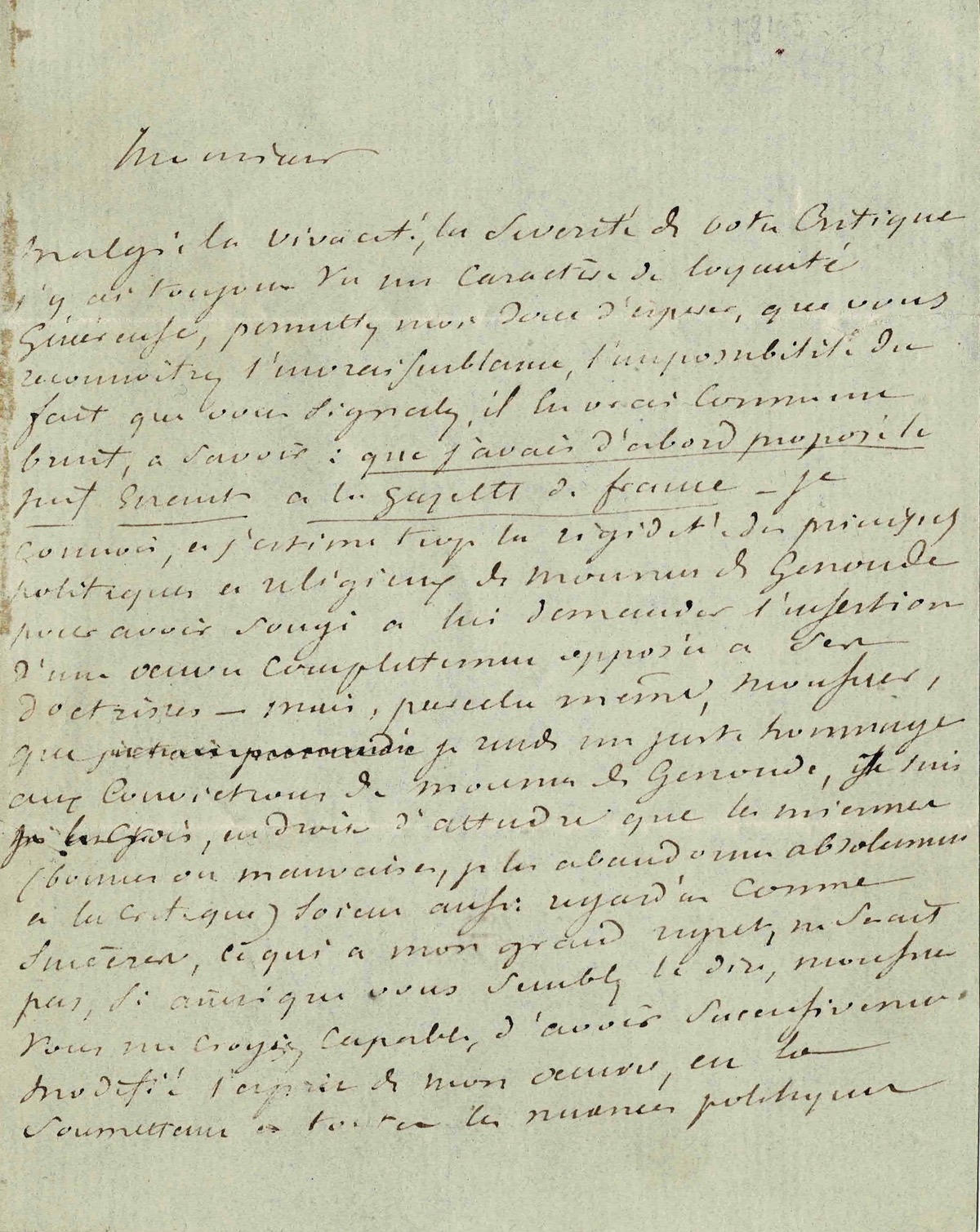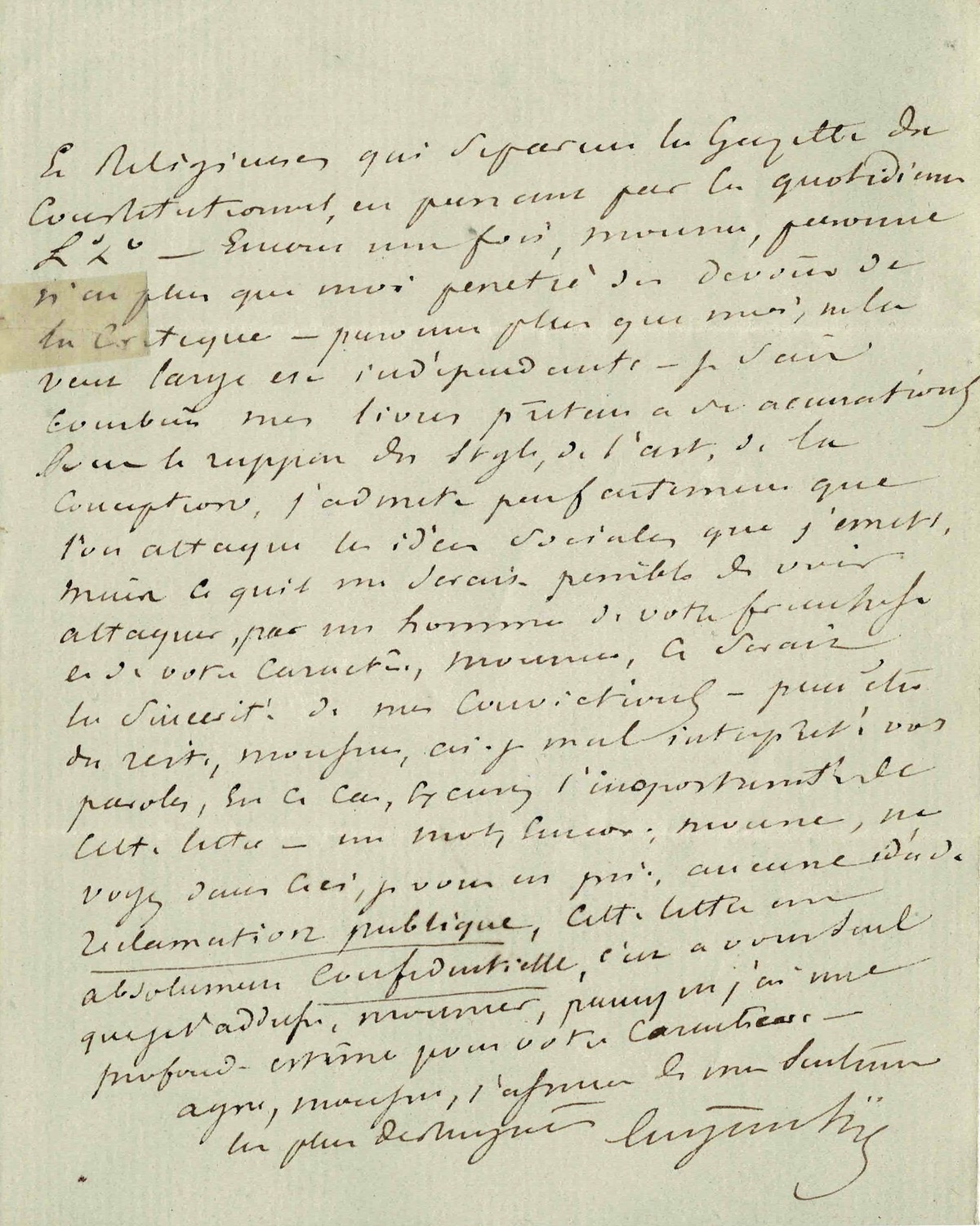Eugene SUE (1804.1857)
Autograph letter signed to the critic Alfred Nettement.
Two very dense 12° pages.
Trace of adhesive on the back.
Without place or date [November 8, 1844]
“I know how much my books lend themselves to accusations in terms of style, art, conception, I perfectly admit that the social ideas that I put forward are attacked, but this would be painful for me to see it attacked, by a man of your frankness and your character, sir, it would be the sincerity of my convictions. »
Very beautiful letter from the novelist about The Wandering Jew . Eugène Sue protests to Nettement against the improbable rumor according to which he had submitted his novel to the Gazette de France, a royalist newspaper directed by Abbot Genoude.
_______________________________________________________________
“Despite the vivacity, the severity of your criticism, I have always seen in it a character of generous loyalty, allow me to hope that you will recognize the improbability, the impossibility of the fact that you point out, it is as true as a rumor, namely: that I had first proposed the Wandering Jew to the Gazette de France . I know and appreciate the rigidity of Mr. de Genoude's political and religious principles too much to have thought of asking him for the insertion of a work completely opposed to his doctrines - but, by this very fact, sir, I pay a just tribute to the convictions of Mr. de Genoude, I am, I believe, entitled to expect that mine (good or bad, I leave them absolutely to criticism) will also be considered sincere, which to my great regret would not be , if as you seem to say, sir, you believed me capable of having successively modified the spirit of my work, by subjecting it to all the political and religious nuances which separate the Gazette from the Constitutionnel, via the Quotidienne, etc. Once again, sir, no one is more aware of the duties of criticism than I – no one wants it to be broad and independent more than I – I know how much my books lend themselves to accusations in relation to style, art , of the conception, I perfectly admit that the social ideas that I put forward are attacked, but what it would be painful for me to see attacked, by a man of your frankness and your character, sir, would be the sincerity of my convictions - perhaps, sir, I have misinterpreted your words, in which case, excuse the importunity of this letter - one more word: do not see in this, I beg you, any idea of public complaint , this letter is absolutely confidential , it is to you alone that I am addressing it, sir, since I have deep esteem for your character. Please accept, sir, the assurance of my most distinguished feelings. ".
_______________________________________________________________
Eugène Sue reacted to Alfred Nettement's article published in La Gazette de France on November 8, 1844. In this article, the first in a series of ten devoted to the wandering Jew, Nettement wrote: " I must tell you this story that Mr. Sue's friends are beginning to circulate in salons, to excuse the spirit of his book. According to them, the author would have first proposed his subject to La Gazette de France, promising, of course, to give his novel a social, moral, religious color. On the refusal of the Gazette, which would not have understood the inestimable value of the present that Mr. Sue wanted to give him, he would have contacted the Quotidienne, which would not have been better inspired. So, he would have made offers to the Debates, he would not have been happier, supposedly because the Debates feared the annoying jokes that this Jewish name could inspire in the bad press, and the incongruous comparisons which, thanks to M. de Cormenin , would establish themselves between the unfortunate intendant of the civil list and the Jew, type of avarice and passion for gold. It was therefore only in desperation and for lack of having found elsewhere men of good enough taste to offer a hundred thousand francs from the wandering Jew , that Mr. Sue resigned himself, as a stopgap measure, to asking at the Constitutionnel an asylum for its eternal traveler. What to do there? Mr. Véron is the only one who had the wit to put the price on this treasure, it was therefore necessary to write the wandering Jew in the ideas of the Constitutionnel, and make him a declared supporter of Mr. Thiers and Mr. Cousin . Here's the story, I'll give it to you for what it's worth. » Clearly specified in a note: “ Is it necessary to say that we do not add any credence to this little tale which we attribute to the unofficial imagination of people who wanted to attenuate the wrongs of the author of The Wandering Jew . »
Bibliography:
Alfred Clearly. Edmond Biré. Lecoffre, 1901. Pages 319-321.
General correspondence of Eugène Sue. Volume II. JP Galvan. Ed. H. Champion.


